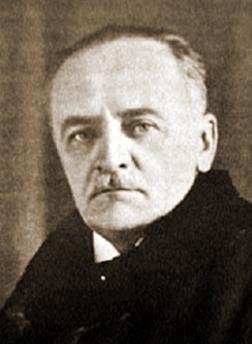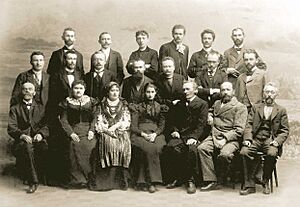Bohdan Lepky facts for kids
Quick facts for kids
Bohdan Lepky
|
|
|---|---|
| Богдан Лепкий | |
 |
|
| Born | 9 November 1872 Krohulets, Galicia, Austria-Hungary
|
| Died | 21 July 1941 Kraków, Kraków District, General Governorate for the Occupied Polish Region
|
| Burial place | Rakowicki Cemetery |
| Nationality | Ukrainian |

Bohdan Teodor Nestor Lepky (born November 9, 1872 – died July 21, 1941) was a talented Ukrainian writer, poet, and artist. He was also a respected scholar and public figure. Bohdan was born in the village of Krohulets.
Contents
Bohdan's Early Life and Learning
Bohdan started school in Berezhany when he was just six years old. He went to a special school and then to a gymnasium in the same town. Bohdan remembered that students from different backgrounds got along well. They respected each other and often joined choirs and plays together. These performances included both Polish and Ukrainian works.
After finishing gymnasium in 1891, Bohdan went to the Academy of Arts in Vienna. But he soon decided to study literature instead. He then attended the Lviv University. There, he studied Ukrainian history and literature. He was also part of a student society called Vatra and a choir named Boyan. After graduating in 1895, he returned to the gymnasium in Berezhany. He worked there as a teacher of Ukrainian and German languages.
Life in Kraków
In 1899, Bohdan Lepky moved to Kraków. Jagiellonian University in Kraków started new classes on Ukrainian language and literature. They offered Bohdan a teaching position, and he stayed there for the rest of his life.
In Kraków, Bohdan's home was a meeting place for many Ukrainian scholars. Famous visitors included Kyrylo Studynsky and Vasyl Stefanyk. He also met Polish artists like Kazimierz Tetmajer, a poet, and Stanisław Wyspiański, a playwright and painter.
Famous Works and Legacy
Bohdan Lepky is well-known for his Polish translation of an old Ukrainian story. This story is called Słowo o pułku Igora, or The Tale of Ihor's Host (1905). He is also famous for his poem "Zhuravli" (Cranes), written in 1910. This poem became a very popular song. The song's words are: "You see, my brother, my friend, the gray string of cranes flying off into the distance."
Bohdan later shared how he wrote "Zhuravli." He said he was walking home after seeing a play by Stanisław Wyspiański. The leaves were rustling, and he heard cranes flying above. The poem seemed to come to him naturally. His brother, Lev Lepky, later set the poem to music.
Bohdan Lepky passed away in Kraków. He is buried in the Rakowicki Cemetery there.
Literary Works
- Cranes (Ukrainian: Видиш, брате мій) – 1910. This poem became a famous song.
- Song Lead (Ukrainian: Заспів)
- Mazepa (Ukrainian: Мазепа) – a work about Ivan Mazepa, a Ukrainian leader.
- Away from life, small grief (Ukrainian: Набік життя журбо дрібна)
- I've Lost Contact with You (prose poem) – 1906
- Nastya (Ukrainian: Настя) – 1897
- In the Forest (Ukrainian: В лісі) – 1896
- Revenge (Ukrainian: Помста) – 1901
- Three Portraits – a book of memories. In it, he wrote about meeting Ivan Franko and Vasyl Stefanyk. He also wrote a lot about Władysław Orkan.
- Stricha (Ukrainian: Стріча) – 1899
English Translations
- Short story "Why?".
 | Janet Taylor Pickett |
 | Synthia Saint James |
 | Howardena Pindell |
 | Faith Ringgold |

